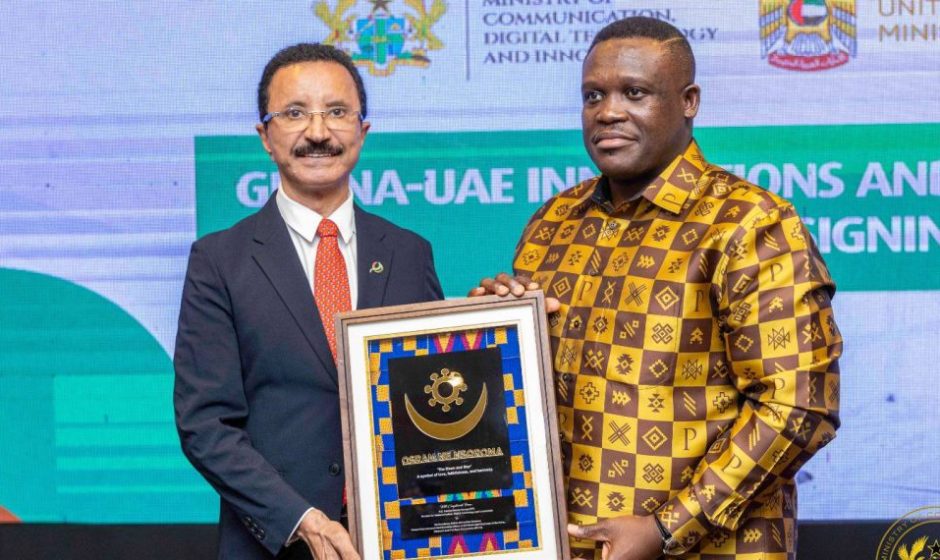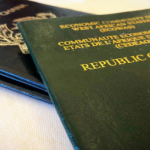Ghana is flying its flag high in the tech world with a landmark $1 billion deal for an AI and innovation hub. Ghana has struck a groundbreaking partnership with the United Arab Emirates (UAE) to establish one of Africa’s biggest technology hubs. The agreement – a memorandum of understanding between Ghana’s Ministry of Communication and Digital Technology and the UAE’s Ports, Customs and Free Zone Corporation (PCFC) – will see a $1 billion AI and innovation hub fully funded by the UAE side, with Ghana providing the land. The project is slated to break ground in 2026 on a sprawling 25 square-kilometer site in Ningo-Prampram (near Accra) and finish construction by the end of 2027. This initiative, officially named the “Ghana-UAE Innovations and Technology Hub,” aims to accelerate Ghana’s digital transformation and position the country as West Africa’s leading artificial intelligence (AI) hub.
A Game-Changing Investment: Nature and Scope of the Hub
The scope of this investment is enormous and unprecedented in the region. Ghana’s minister for communication, digital technology and innovation, Sam Nartey George, signed the deal on Ghana’s behalf, while Sultan Ahmed bin Sulayem, Chairman of PCFC (and CEO of DP World), signed for the UAE. Under the agreement, PCFC will bring the capital, technology, and global partnerships, while Ghana contributes prime land and local support. The planned 25 km² innovation zone will effectively be a “smart economic zone” focused on tech, combining innovation facilities with logistics and infrastructure to attract businesses. In fact, PCFC has a proven track record – it operates more than 11 innovation hubs in Dubai in collaboration with major tech companies like Microsoft, Oracle, IBM, and others. It’s expected that Ghana’s hub will similarly host global tech giants: officials anticipate up to 11,000 companies under PCFC’s network could establish a presence in Ghana, including big names such as Microsoft, Meta (Facebook), Oracle, IBM, and Alphabet (Google’s parent). This would instantly make the Ningo-Prampram facility Africa’s largest innovation hub by capacity and international reach.
The hub is not just about office parks and data centers – it represents a comprehensive ecosystem. The first phase of construction will cover about 25 acres and is set to begin in 2026, with completion targeted within two years. Ghana is providing the land and policy support, while the UAE’s PCFC will fully fund this phase. The initiative is designed to include facilities for AI engineering, business process outsourcing (BPO), knowledge process outsourcing (KPO), and extensive data infrastructure for machine learning development. In essence, it will be a one-stop hub for AI and emerging technologies, where international firms can set up regional bases and collaborate with local startups and talent. Major tech firms expanding to West Africa have a strong incentive to plug into this hub’s network and infrastructure. The project’s scale and backing have led Ghanaian officials to hail it as a game-changer; Sam George noted it will be “one of the biggest investments” Ghana has seen in the tech sector in recent years.
Economic Impact on Ghana: Jobs, Growth and Innovation
This $1 billion investment is poised to deliver a significant economic boost to Ghana. For a country eager to diversify its economy beyond commodities like gold and cocoa, the tech hub represents a new pillar of growth. Firstly, it promises to create thousands of jobs for Ghanaians, especially for the youth. Rather than flying in expatriate workers, the plan is for the many tech companies setting up in the hub to hire locally and build Ghanaian capacity. “As you train a million coders, you need to have jobs for these coders… and that is where PCFC comes in,” Sam George explained, underscoring that the hub will absorb graduates of Ghana’s digital skills programs by bringing in those 11,000+ companies to Ghana. The One Million Coders program, launched in 2025 as part of President John Mahama’s vision, is already teaching large numbers of young Ghanaians software development and AI skills. The new hub will provide a place for these newly skilled coders and engineers to find employment and innovate, reversing the brain drain and nurturing homegrown tech talent.
Local entrepreneurs and startups are also set to benefit. The presence of global tech firms and a vibrant innovation zone can foster knowledge transfer, mentorship, and access to funding for Ghana’s tech startups. It effectively puts Ghana on the map as a West African tech hotspot, potentially attracting even more foreign direct investment beyond the initial $1 billion. The government envisions synergistic growth: the hub will catalyze industries like business outsourcing, where Ghana can become a destination for AI-driven services and support centers for international companies. Additionally, ancillary services – from construction to telecom, education and real estate – will get a lift during the development of the hub. Ghana’s ICT sector has been growing, and this project could significantly increase its contribution to GDP by creating an entire technology cluster. Sultan bin Sulayem of PCFC affirmed the broader economic impact, stating that “this smart economic zone, combining innovation, technology, and logistics, will foster commercial growth and strengthen Ghana’s industrial and technological infrastructure.” In short, the deal injects capital and confidence into Ghana’s economy, signaling to the world that Ghana is open for high-tech business.
Technological Potential Across Key Sectors
An AI-focused innovation hub of this magnitude holds vast potential to transform various sectors of Ghana’s economy and society. By concentrating resources, expertise, and innovation, the hub can accelerate technology adoption in everyday life. Here are a few key sectors poised to benefit:
- Education: Ghana is prioritizing tech education through initiatives like the One Million Coders program to build a digitally savvy workforce. With the hub’s launch, we could see more AI-driven educational tools and partnerships. AI can personalize learning for students, provide virtual tutoring, and help bridge educational gaps, especially in remote areas. The presence of big tech companies could also mean investments in STEM programs and research collaborations with local universities. Overall, the hub will reinforce Ghana’s efforts to equip its youth with future-ready skills, making education more accessible and tech-oriented.
- Healthcare: AI offers huge promise for Ghana’s healthcare sector, and the new hub can amplify this. Ghana already has homegrown AI innovations like MinoHealth AI Labs, which use AI to automate medical diagnoses for illnesses such as pneumonia, malaria, and tuberculosis. With increased AI R&D, hospitals and startups could develop better diagnostic tools (for example, AI-driven X-ray and MRI analysis) and telemedicine platforms. In fact, Ghana has been part of projects using AI for things like screening tuberculosis via X-rays and improving maternal health outcomes. The hub could attract companies building healthtech solutions, leading to improved predictive healthcare (like AI models for disease outbreak prediction) and more efficient health services delivery – a boon for both urban and rural healthcare in Ghana.
- Fintech: Ghana is known for its fintech prowess (it was one of the early adopters of mobile money in Africa), and AI can take it to the next level. Local fintech startups are already deploying AI to enhance mobile payment platforms and financial services. With the innovation hub in place, fintech companies will gain access to advanced AI infrastructure and expertise. We can expect smarter fraud detection algorithms, AI-based credit scoring to expand loans to those without formal credit history, and personalized financial products. This will deepen financial inclusion in Ghana, as AI helps banks and fintech firms reach underserved populations with tailored services. A more robust, AI-enhanced fintech sector also cements Ghana’s status as a financial technology leader in the region.
- Agriculture: Agriculture remains the backbone of Ghana’s economy and is ripe for an AI revolution. Already, Ghanaian farmers and agritech companies use AI for real-time data on weather, crop diseases, and market prices, which has helped increase crop productivity and reduce losses. The new tech hub could accelerate development of AI-powered tools for precision agriculture – think drones and sensors analyzing crop health, AI models predicting rainfall and pest outbreaks, and smart irrigation systems optimizing water use. With greater resources, local startups might create AI solutions that give smallholder farmers personalized advice, or improve supply chain logistics from farm to market. By leveraging AI in agriculture, Ghana can boost food security and farmer incomes, showing how high-tech innovation can benefit even traditional sectors like farming.
A New Chapter in Ghana–UAE Relations
Beyond the immediate economic and tech benefits, this development is a significant milestone in Ghana–UAE relations. It signifies a deepening partnership between the West African nation and the Gulf state. The UAE has been increasing its investments and footprint in Africa, and Ghana – known for its stable governance and business-friendly environment – has emerged as an attractive partner. Trade between Ghana and the UAE has grown rapidly in recent years (UAE exports to Ghana roughly doubled from $342 million in 2018 to $712 million in 2023). Until now, much of the cooperation centered on areas like energy, trade, and infrastructure. For instance, the UAE’s DP World is a major global ports operator, and its affiliation with PCFC hints at potential future collaborations in Ghana’s logistics and transport sectors as well.
The $1 billion AI hub project brings a new dimension to this bilateral relationship – a move from traditional investments to cutting-edge digital economy initiatives. It aligns with the UAE’s strategy of exporting its expertise in innovation and smart city development. Dubai’s own evolution into a tech hub is a model that Ghana can tap into. As Sultan bin Sulayem noted, the UAE seeks to share the know-how it honed in Dubai’s innovation ecosystem to help Ghana become a “regional technology powerhouse” in Africa. From Ghana’s perspective, partnering with the UAE provides not only funding but also a fast-track to world-class technology and infrastructure. This could strengthen diplomatic ties, as both nations will have teams working closely on the ground (the project will be managed by joint teams specializing in AI and investment).
Importantly, this collaboration fits into Ghana’s broader economic diplomacy – the country has been actively seeking strategic partnerships beyond its traditional allies. The UAE, with its financial clout and interest in African markets, is an ideal partner to execute transformative projects like this. We may also see softer aspects of Ghana–UAE ties grow, such as knowledge exchange programs, tech conferences, and cultural exchanges centered on innovation. In summary, the AI hub is not just a standalone venture but part of a strengthening Ghana–UAE alliance that could pave the way for more joint initiatives in the future.
Ghana’s AI Ambitions in the African Context
Ghana’s bold push to become an AI and tech innovation hub comes at a time when many African countries are racing to harness the power of AI. Across the continent, there’s a recognition that AI and digital technology can leapfrog development in sectors from agriculture to finance. Ghana is not alone in this ambition, but it is carving out its own path. In fact, Ghana already has some bragging rights – Google chose Accra, Ghana for its first AI research center in Africa in 2019, where researchers work on African-specific challenges like mapping remote areas and expanding AI language support for local languages. This established Ghana early on as a notable African player in AI research, alongside larger economies like Nigeria and South Africa.
Other countries are also making strides. Kenya, for example, has been developing Konza Technopolis (dubbed the “Silicon Savannah”), a new smart city aimed at attracting tech investment and housing its own innovation hubs. Nigeria – Africa’s most populous nation – recently unveiled a National AI Strategy to position itself as a leading AI destination in Africa, signaling its intent to compete in the same arena as Ghana. Rwanda is often highlighted for its proactive approach to tech: it uses AI in initiatives like drone delivery for medical supplies and has a comprehensive national policy on AI. In Ghana, Kenya, and South Africa today, you’ll find AI being used on farms (e.g. drones for farm management) and in hospitals (AI-assisted diagnostics), improving efficiency and decision-making on the ground. The race is on, and each country has its angle.
What’s interesting is how Ghana’s approach differs from some of its peers. Ghana’s strategy heavily emphasizes openness to foreign investment and partnerships to boost its AI ecosystem – the $1 billion UAE-backed hub being a prime example. Analysts have noted that Ghana tends to frame AI advancement as a way to attract global investment and know-how, reflecting an “accommodative” stance toward outside collaboration. Rwanda, by contrast, has been somewhat more cautious, focusing on building local capacity and maintaining more control – essentially a more self-reliant or “defensive” approach to guard against over-reliance on foreign tech giants. Neither approach is right or wrong, but Ghana’s big bet with the UAE shows it’s leaning into globalization as a catalyst for its AI aspirations.
Crucially, Ghana is also developing its own national AI framework to ensure these technologies are used ethically and inclusively. The country released a National Artificial Intelligence Strategy (2023–2033), which emphasizes “trustworthy AI” and aims to balance innovation with privacy, accountability, and local needs. This means that even as Ghana welcomes international partners, it’s mindful of setting up governance so that AI benefits Ghanaian society broadly. The hope is that by 2027, when the new AI Innovation Hub is up and running, Ghana will not only have state-of-the-art facilities but also a skilled workforce and a supportive policy environment to truly become a continental leader in AI and digital innovation. It’s an ambitious goal, and the world will be watching to see how Ghana’s strategy plays out. If successful, it could mark a turning point, showcasing how an African country can leap into the forefront of tech innovation through strategic global partnerships and forward-looking investments.
Sources:
- Business Insider Africa – “Ghana, UAE sign $1bn deal to build AI and tech hub hosting Microsoft, Meta, others” (Adekunle Agbetiloye, June 3, 2025)
- Ghanaian Times (via AllAfrica) – “Ghana, UAE Sign $1bn Deal to Build Africa’s Largest Innovation Hub” (Kingsley Asare, June 2, 2025)
- AfroTech – “Ghana Attracts $1 Billion UAE Investment To Launch AI Innovation Hub By 2027” (Chanelle Hayes, June 5, 2025)
- People of Color in Tech (POCIT) – “Ghana Will Build $1 Billion Innovation Hub Funded By PCFC” (Habiba Katsha, May 2025)
- UPPERNEWS – “UAE and Ghana Sign Agreement to Establish First Economic Zone” (UpperNews Team, June 2, 2025)
- International Trade Administration – trade.gov – “Ghana Artificial Intelligence (Market Intelligence)” (Nov 25, 2024)
- University College Dublin – News & Opinion – “AI policies in Africa: lessons from Ghana and Rwanda” (Apr 25, 2025)



